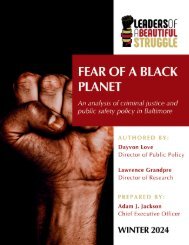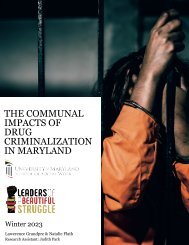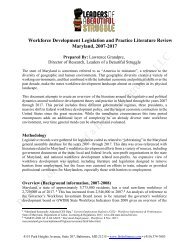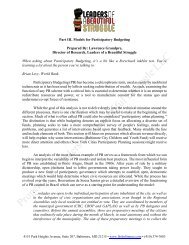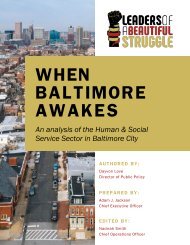Drug Decriminalization in Maryland Through an African Centered Research Paradigm- Analysis and Recommendations
This document offers guidance for theorizing questions related to a proposed research project purposed to advance drug decriminalization in Maryland.
This document offers guidance for theorizing questions related to a proposed research project purposed to advance drug decriminalization in Maryland.
- No tags were found...
You also want an ePaper? Increase the reach of your titles
YUMPU automatically turns print PDFs into web optimized ePapers that Google loves.
concepts <strong>an</strong>d f<strong>in</strong>d the truth embedded <strong>in</strong> them rather th<strong>an</strong> assume contrast<strong>in</strong>g ideas are<br />
diametrically opposed.<br />
It is crucial, along these l<strong>in</strong>es, that we del<strong>in</strong>eate the critical (“deconstructive”) components<br />
of Afric<strong>an</strong> centered research paradigms from “critical” research paradigms produced with<strong>in</strong> the<br />
“critical theory” tradition. A vital part of the dist<strong>in</strong>ction is centered around the heuristic component<br />
of the research. Rather th<strong>an</strong> recogniz<strong>in</strong>g the cont<strong>in</strong>gency <strong>an</strong>d power relations beh<strong>in</strong>d so-called<br />
“objective” knowledge claims as <strong>an</strong> end <strong>in</strong> itself, as the Critical Theory often attempts with<br />
rhetorical <strong>an</strong>alysis, it is a materialist paradigm which seeks to underm<strong>in</strong>e not only oppressive<br />
systems but the very systems of thought which make this oppression possible. As Schiele notes:<br />
“...the Afrocentric paradigm endeavors to foster what Foucault (1977) calls the<br />
<strong>in</strong>surrection of subjugated knowledges. The Afrocentric paradigm is a form of knowledge<br />
<strong>in</strong>surrection <strong>in</strong> that it challenges <strong>in</strong>terpretations of people of Afric<strong>an</strong> descent that stem from<br />
groups who benefit from the oppression of people of Afric<strong>an</strong> <strong>an</strong>cestry <strong>an</strong>d advocates that<br />
these <strong>in</strong>terpretations emerge from the narratives of black people themselves. However,<br />
unlike some from the postmodernist camp (see, for example,Baum<strong>an</strong>, 1992; Lyotard, 1984;<br />
Seidm<strong>an</strong>, 1994), the Afrocentric paradigm does not view the affirmation of a subjugated<br />
group's narrative as <strong>an</strong> end <strong>in</strong> itself. The Afrocentric paradigm is materialist <strong>in</strong> that it<br />
endeavors to validate the narratives of people of Afric<strong>an</strong> descent not only for psychological<br />
(i.e., self-esteem) <strong>an</strong>d scientific (i.e., knowledge validation) reasons but also to ch<strong>an</strong>ge the<br />
political <strong>an</strong>d economic conditions faced by people of Afric<strong>an</strong> descent. Knowledge<br />
<strong>in</strong>surrection with<strong>in</strong> the Afrocentric perspective defies Eurocentric universalism <strong>an</strong>d strives<br />
to abolish the material conditions <strong>an</strong>d consequences of racial <strong>an</strong>d cultural oppression.<br />
Similar to those with<strong>in</strong> the r<strong>an</strong>ks of the Fr<strong>an</strong>kfurt School (see Habermas, 1971;<br />
Horkheimer <strong>an</strong>d Adorno 1994; Marcuse, 1964), the Afrocentric view of social work<br />
research, <strong>an</strong>d by extension social theory, merges social ch<strong>an</strong>ge activities with those of<br />
knowledge <strong>in</strong>quiry <strong>an</strong>d development.<br />
Unlike the proponents of "Critical Theory," the Afrocentric paradigm does not limit its<br />
social ch<strong>an</strong>ge activities to the elim<strong>in</strong>ation of a specific economic system with its<br />
accomp<strong>an</strong>y<strong>in</strong>g ideology, although this is import<strong>an</strong>t. Rather, the Afrocentric paradigm<br />
aspires to elim<strong>in</strong>ate the underly<strong>in</strong>g worldview that creates the need for such <strong>an</strong> exploitative<br />
system <strong>in</strong> the first place.<br />
In essence, Afrocentric social work research encourages hum<strong>an</strong>s to become more at one<br />
with the Creator <strong>an</strong>d the universe. This "oneness with nature <strong>an</strong>d God" cosmology is<br />
thought to br<strong>in</strong>g about respect <strong>an</strong>d appreciation for all aspects of nature—<strong>in</strong>clud<strong>in</strong>g hum<strong>an</strong><br />
be<strong>in</strong>gs—both for the common aspects <strong>an</strong>d the different ones, <strong>an</strong>d is believed to preclude<br />
the exploitative behavior that accomp<strong>an</strong>ies oppression (Schiele, 1994). In this regard,<br />
4151 Park Heights Avenue, Suite 207, Baltimore, MD 21215 • www.lbsbaltimore.com • (410) 374-7683




